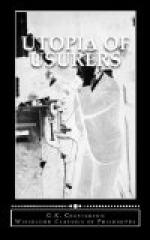That, I think, is the commonest English view of the French Revolution; and it will not survive the reading of two pages of any real speech or letter of the period. These human beings were human; varied, complex and inconsistent. But the rich Englishman, ignorant of revolutions, would hardly believe you if you told him some of the common human subtleties of the case. Tell him that Robespierre threw the red cap in the dirt in disgust, while the king had worn it with a broad grin, so to speak; tell him that Danton, the fierce founder of the Republic of the Terror, said quite sincerely to a noble, “I am more monarchist than you;” tell him that the Terror really seems to have been brought to an end chiefly by the efforts of people who particularly wanted to go on with it—and he will not believe these things. He will not believe them because he has no humility, and therefore no realism. He has never been inside himself; and so could never be inside another man. The truth is that in the French affair everybody occupied an individual position. Every man talked sincerely, if not because he was sincere, then because he was angry. Robespierre talked even more about God than about the Republic because he cared even more about God than about the Republic. Danton talked even more about France than about the Republic because he cared even more about France than about the Republic. Marat talked more about Humanity than either, because that physician (though himself somewhat needing a physician) really cared about it. The nobles were divided, each man from the next. The attitude of the king was quite different from the attitude of the queen; certainly much more different than any differences between our Liberals and Tories for the




